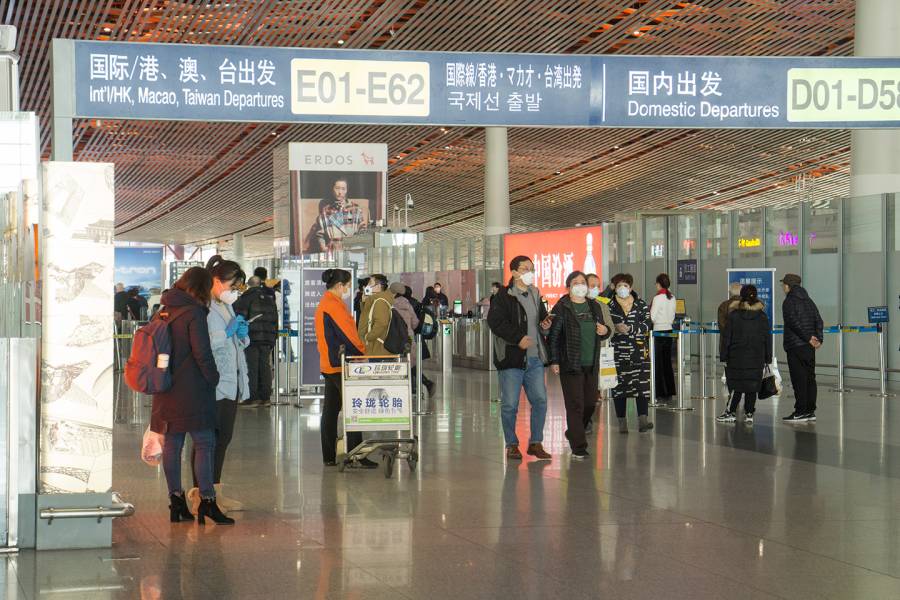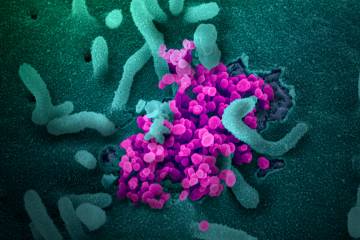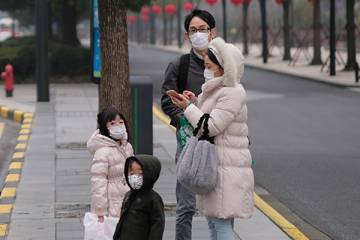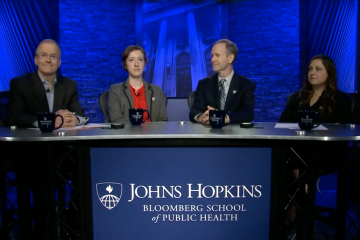Two Johns Hopkins experts provided new insights Wednesday on the evolving novel coronavirus outbreak, offering both a global public health perspective and information about ongoing preparedness efforts at Hopkins.
Epidemiologist Jennifer Nuzzo, senior scholar at the Center for Health Security and associate professor at the Bloomberg School of Public Health, and Lauren Sauer, director of operations at the Johns Hopkins Office of Critical Event Preparedness and Response, or CEPAR, took part in the information session, which was hosted by the Johns Hopkins Carey Business School. Earlier this week, the school hosted a conversation on the economic impacts of the coronavirus, now known as COVID-19.
Video credit: Johns Hopkins University
More than 75,750 infections and 2,130 deaths have been attributed to the coronavirus, according to an online data tracker maintained and updated by the Johns Hopkins Center for Systems Science and Engineering. The vast majority of those cases are in mainland China, but COVID-19 has now spread to at least 30 countries around the world.
University officials reiterated in a message Thursday that there are no confirmed cases of COVID-19 at Johns Hopkins or in the state of Maryland.
Nuzzo and Sauer acknowledged the difficulty of quantifying an ongoing and evolving outbreak with many unknowns, but they also elucidated important news and takeaways about COVID-19.
Is the information being reported about the number of cases accurate?
Nuzzo said she doesn't believe the figures on COVID-19 are fully accurate for several reasons, including that they only capture people ill enough to seek medical attention. In addition, most current testing methods for the virus are limited geographically, meaning anyone who hasn't traveled to China recently is "not likely to be counted," she said.
Nuzzo also said she believes the fatality rate—roughly 2% of the total number of reported cases—may be lower in reality.
"Nonetheless, 2% from a public health perspective is an enormous percentage," she said, on par with the 1918 influenza pandemic. "Even 1% would pose burdens on health systems across the world."
Does COVID-19 qualify as a pandemic?
Nuzzo said she does not believe it is possible to prevent the spread of coronavirus to different parts of the world. "I am of the belief ... that we are in the early stages of a pandemic," she said, clarifying that in epidemiology, that term refers "purely to geographic spread."
"That word is scary, and it's used in movies, [but] that word is not a proxy for a deadly apocalyptic virus," she added. "I am simply meaning that it will be in multiple parts of the planet."
By those standards, she says she believes COVID-19 meets the World Health Organization's definition of pandemic, "though WHO has not yet acknowledged this." There's some debate, she said, over whether there's sustained community transmission—a key indicator of pandemic status.
"I think it's important for us to ... talk openly about whether containment of an epidemic is possible, or whether we are exacerbating pandemic spread, because my worry is we're diverting resources from the community level," Nuzzo said.
Are quarantines a standard response?
In short: No.
"It's actually not a tool we [use] routinely in public health," Nuzzo said.
More common is isolation—restricting an infected person to their home or the hospital. "There's an infrastructure to do this, we're familiar with it," she said.
With the recent and widely publicized quarantines on cruise ships, for example, the ethics and effectiveness of this approach are being questioned, Nuzzo said. "You're essentially holding people; you don't know if you're … increasing their probability of becoming infected, because you don't let them off the ship."
Is internal travel in the U.S. a concern?
While it's still unknown exactly where COVID-19 is circulating, both Sauer and Nuzzo said there are low risks associated with U.S. domestic travel.
"If you wouldn't postpone your trip for influenza, I'm not sure that it makes sense to postpone it for COVID-19," Nuzzo said.
Sauer added that the university's guidance on travel reflects "the best knowledge we have available right now."
What is Johns Hopkins doing to monitor the outbreak?
"We are working behind the scenes to make sure our community is safe and protected, and encourage people to not overreact but also to not underreact," Sauer said.
The Hub maintains a resource page that includes the university's most recent guidance on coronavirus, including information on how to schedule an initial health screening before visiting a doctor or emergency room. Additionally, Hopkins community members can write to CEPAR directly at cepar@jhmi.edu with specific and non-urgent questions about coronavirus.
Sauer emphasized the need to stay updated with factual information rather than to buy into hype and misinformation.
"We want to make sure we are not letting fear move toward xenophobia, racism, or rash or inappropriate decisions about community members," she said.
Posted in Health
Tagged public health, epidemiology, coronavirus












